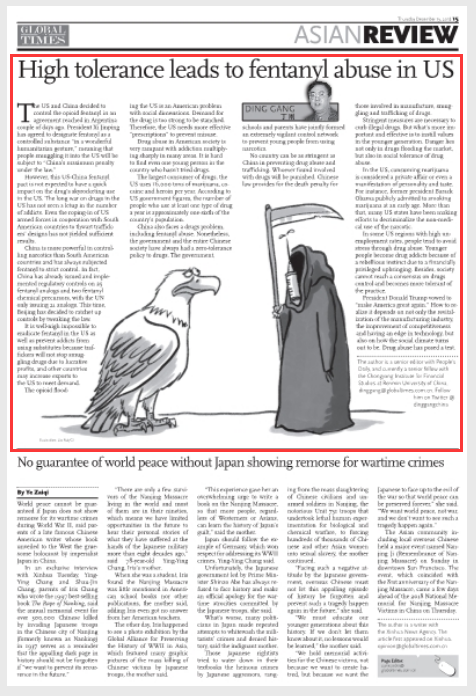Major Power Relations
Your Present Location: PROGRAMS> Major Power RelationsDing Gang: High tolerance leads to fentanyl abuse in US
By Ding Gang Source: Global Times Published: 2018-12-12
The US and China decided to control the opioid fentanyl in an agreement reached in Argentina couple of days ago. President Xi Jinping has agreed to designate fentanyl as a controlled substance "in a wonderful humanitarian gesture," meaning that people smuggling it into the US will be subject to "China's maximum penalty under the law."

However, this US-China fentanyl pact is not expected to have a quick impact on the drug's skyrocketing use in the US. The long war on drugs in the US has not seen a letup in the number of addicts. Even the roping-in of US armed forces in cooperation with South American countries to thwart traffickers' designs has not yielded sufficient results.
China is more powerful in controlling narcotics than South American countries and has always subjected fentanyl to strict control. In fact, China has already issued and implemented regulatory controls on 25 fentanyl analogs and two fentanyl chemical precursors, with the UN only issuing 21 analogs. This time, Beijing has decided to ratchet up controls by tweaking the law.
It is well-nigh impossible to eradicate fentanyl in the US as well as prevent addicts from using substitutes because traffickers will not stop smuggling drugs due to lucrative profits, and other countries may increase exports to the US to meet demand.
The opioid flooding the US is an American problem with social dimensions. Demand for the drug is too strong to be stanched. Therefore, the US needs more effective "prescriptions" to prevent misuse.
Drug abuse in American society is very rampant with addiction multiplying sharply in many areas. It is hard to find even one young person in the country who hasn't tried drugs.
The largest consumer of drugs, the US uses 16,000 tons of marijuana, cocaine and heroin per year. According to US government figures, the number of people who use at least one type of drug a year is approximately one-sixth of the country's population.
China also faces a drugs problem, including fentanyl abuse. Nonetheless, the government and the entire Chinese society have always had a zero-tolerance policy to drugs. The government, schools and parents have jointly formed an extremely vigilant control network to prevent young people from using narcotics.
No country can be as stringent as China in preventing drug abuse and trafficking. Whoever found involved with drugs will be punished. Chinese law provides for the death penalty for those involved in manufacture, smuggling and trafficking of drugs.
Stringent measures are necessary to curb illegal drugs. But what's more important and effective is to instill values in the younger generation. Danger lies not only in drugs flooding the market, but also in social tolerance of drug abuse.
In the US, consuming marijuana is considered a private affair or even a manifestation of personality and taste. For instance, former president Barack Obama publicly admitted to smoking marijuana at an early age. More than that, many US states have been making efforts to decriminalize the non-medical use of the narcotic.
In some US regions with high unemployment rates, people tend to avoid stress through drug abuse. Younger people become drug addicts because of a rebellious instinct due to a financially privileged upbringing. Besides, society cannot reach a consensus on drugs control and becomes more tolerant of the practice.
President Donald Trump vowed to "make America great again." How to realize it depends on not only the revitalization of the manufacturing industry, the improvement of competitiveness and having an edge in technology, but also on how the social climate turns out to be. Drug abuse has posed a test.
The author is a senior fellow at the Chongyang Institute for Financial Studies at Renmin University of China.























































































 京公网安备 11010802037854号
京公网安备 11010802037854号





